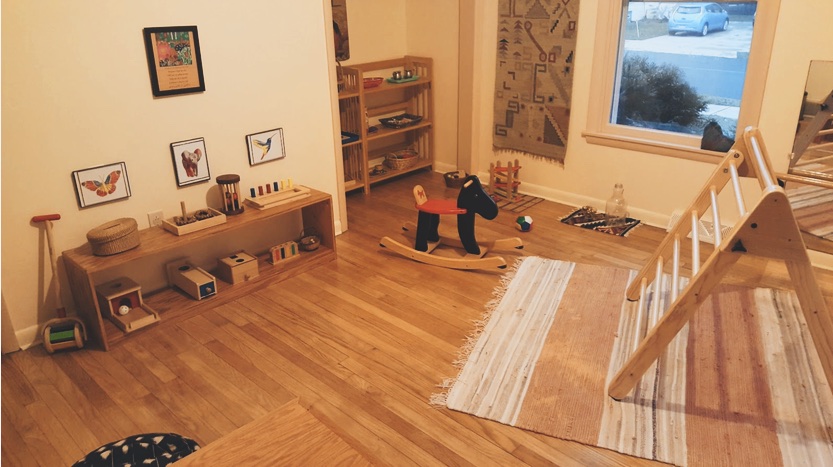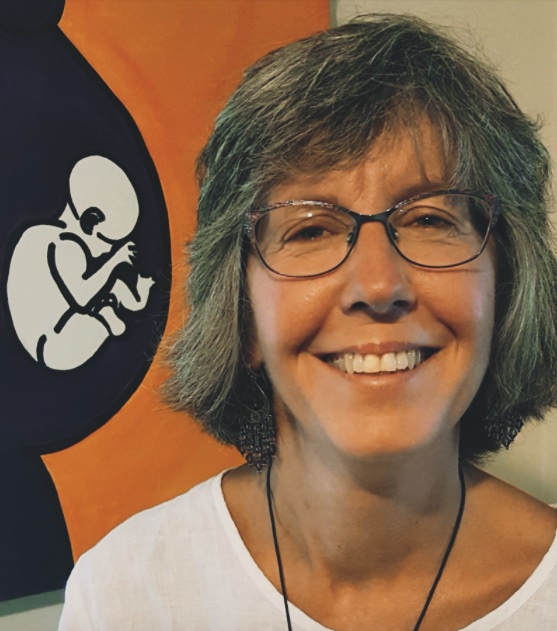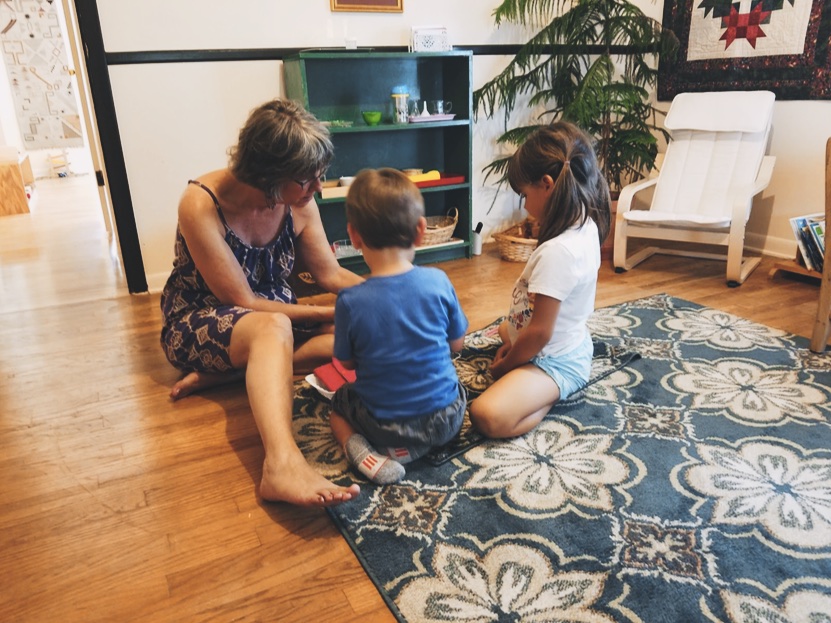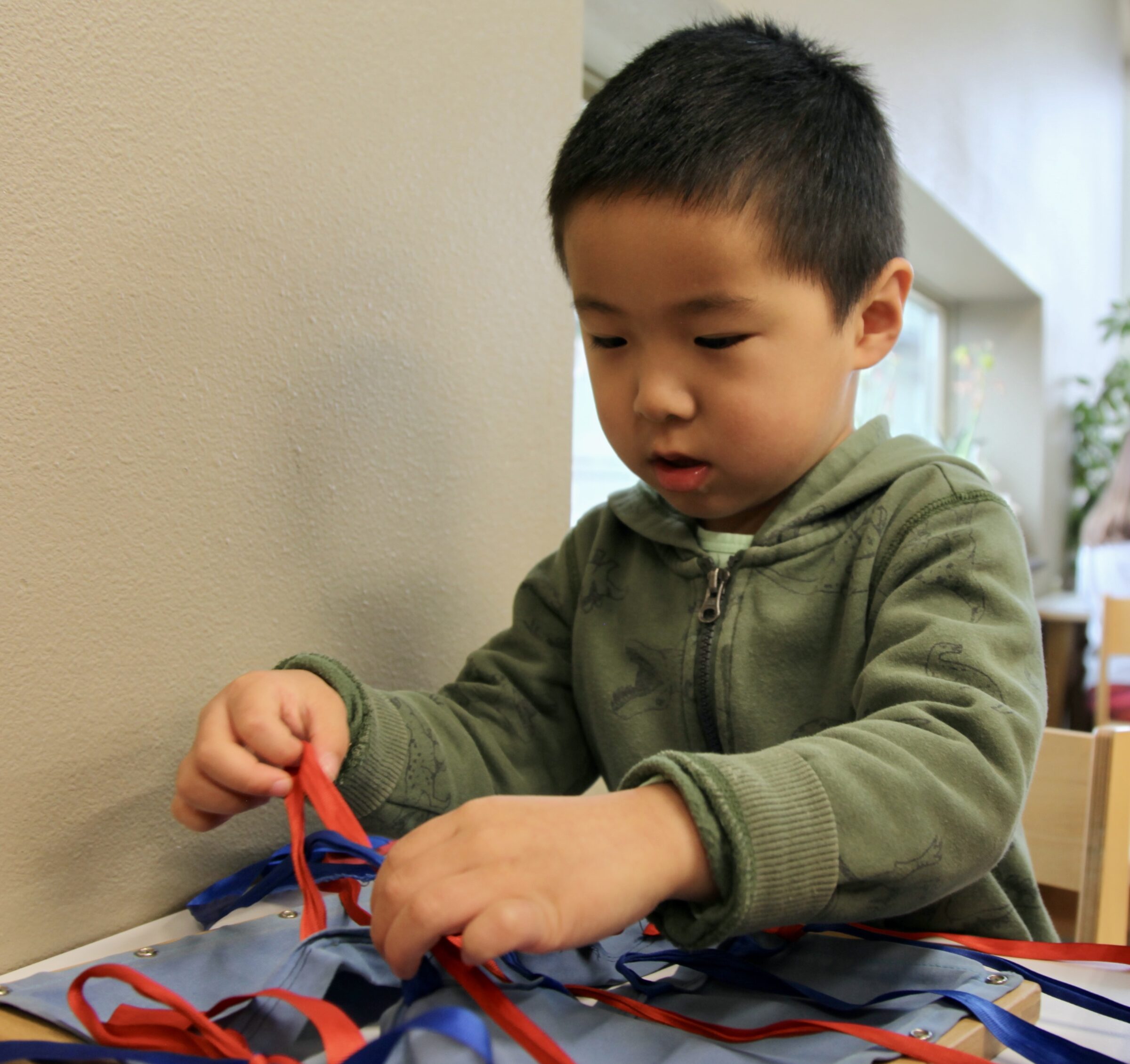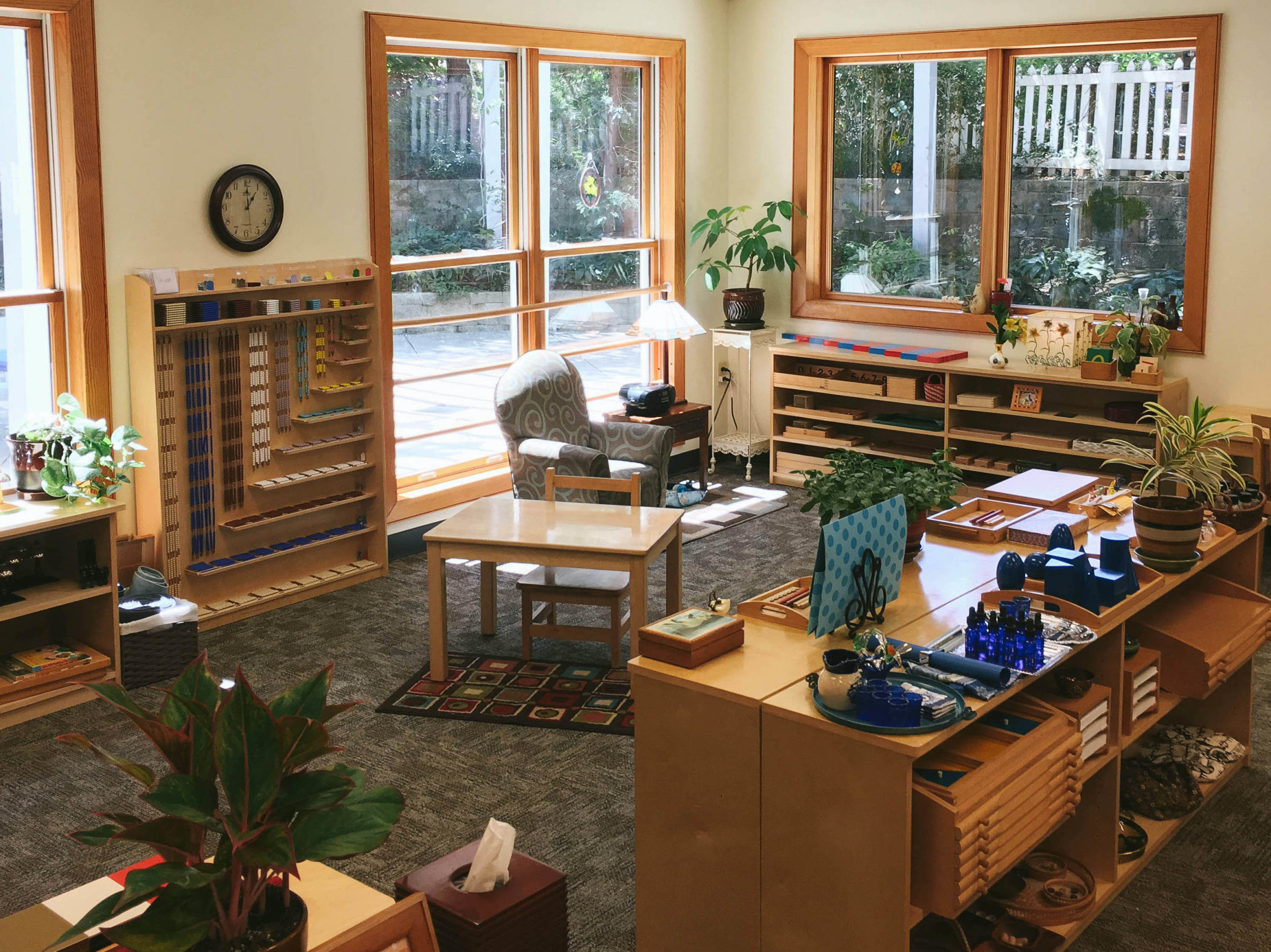Spotlight Ananda Montessori
Spotlights
Pamela Green shares her story as an educator, parent, and advocate. Ananda Montessori (read on for the meaning behind “Ananda”!!) supports parents from the earliest days, through pregnancy, birth, and welcoming this small human into your life.
Q: Can you tell us a little bit about yourself? Your background, your interests, your dreams?
I am the mother of two grown sons (30 and 28), and have been married to my best friend for nearly 33 years. I live in a small town called North East, just outside of Erie, Pennsylvania, on the shores of Lake Erie. I have always loved living close to water, to swim, to walk, and since 2010 my husband and I began sailing on the waters of this Great Lake. I love to sail, and to sleep on our boat.
I enjoy gardening and reading, but most of all I love being with my children, now adults, their partners, and the rest of my family. I also love being with people in ways that are connecting and true. To meet others, and to be met.
I come from a family of five children, and am an identical twin; we were the last born, and my sister is two-minutes older than me. Now that we are older, I can be the one to emphasize this age difference. Many people in my family work(ed) in education, and I was always told how wonderful I would be as a teacher… which made me resist the idea, although I have always loved observing children and felt very natural being with them. To be with a child felt like a meditation for me. Being with children of all ages still brings me to this stillness in myself, to see into their world.
I did study education in college, but I felt that something was missing in my textbooks, and in the discussions on theories of education. Then a wonderful thing happened; a life-changing event for me. In 1981, our instructor took us to a small Montessori school to visit. At this point I was at the end of my second year of studies, and felt little inspiration for the idea of teaching.
Then I entered the Children’s House, and it was as if I walked into a world I never returned from. I was Alyce, in a Wonderland of children living in a house just for them, who greeted me, took my coat, and swiftly caught me up in their work, busy and focused, noisy…yet, still. And where were the adults? It took me some time to find any; there on the floor, focused as well. I looked around me and felt at home. This school was also where a friend’s daughter attended, and I would often pick her up, and usually arrived early so I could begin what I later learned was named Observation.
After this initiation, I went to my advisor and told him that if I was to be in education, it had to be in this mysterious process called Montessori. I shifted my present and future, waiting for a time that I could enter into this study of the child, with a sense that something had been awakened in me. During college I met my future husband, and after graduation, we spent months traveling through Europe, and then returned to be married.
Another life-altering event at this time was my introduction into the world of midwifery and birthing. One of my closest friends was having her first child, and I began to attend prenatals with her…with the same midwife who I am now partnering with as an assistant midwife. So, pregnancy, birthing, Montessori, they all came together for me, leading to what would later become my life’s work.
After marrying we moved to South Carolina, and my first job was teaching in a Montessori school, then once pregnant, we returned to Pennsylvania and family. In 1996 our son was born in the home my husband grew up in. Later, in the early 90’s, I returned to ‘visit’ the first Children’s House I had entered in 1981, and stayed working there for twenty years as an assistant teacher, certified Montessori guide, and finally as Head of School.
This was the school my boys attended, and that my oldest son returned to as an adult, becoming Montessori certified, and teaching for ten years. I have such fond memories of going to his classroom, observing him with the children, presenting lessons on materials I remember him working with when he was young. It was a magical time.
“The word Ananda means profound bliss or joy, and to me is the natural state of the child.”
Over these years I continued to attend births, and began to experience a blending of these two worlds in me. I noticed that what I brought to the children in the classroom was deeply similar to what I brought in my service to birthing women. To prepare the environments, both external and internal, to observe and witness, to allow and trust the natural process in the mother/child to express, to not interrupt unless giving assistance, then to step away. To know that the mysterious process of discovering, transforming, and self-construction in a Mother and child is not my work, but theirs, and that it is sacred.
In 2014 I decided to begin my own program, which I named Ananda Montessori. The word Ananda means profound bliss or joy, and to me is the natural state of the child. In my program, parents attend with their child in Montessori Playgroups for children from birth through age five. I also offer a variety of consultation and mentorship services for parents, teachers, and schools. Some of my adults classes include Preparing for Baby, Pre-birth class, Montessori in the Home, as well as assisting birth services.
My intention is to invite, include, and empower parents who are on their own unique journeys of becoming and being parents. I also facilitate Positive Discipline and Parenting workshops and groups, which I find to be in natural alignment to so much of Montessori.
And what are my dreams? To have every woman supported in pregnancy and birth by caregivers who trust what is yet unknown. Birth, no matter where it occurs, holds a potential for every possibility, and outcome. I dream that women empower themselves with the ownership of their process, so that questions such as, “Am I allowed to…?” are not asked. Just as we offer children the freedom of their experience, without the need for asking permission, we can easily offer women in pregnancy and birth this same respect. The language and actions that caregivers, and teachers, use has tremendous impact, and when these shifts in perspective happen, they can create transformation, for women, children, and families.
Q: Now that the hardest question is out of the way: What’s your favorite color?
My favorite color has always been a fluid one… depending on my state of being. But, I have loved purple for the richness and depth it holds, and lately I am drawn to the tones of sage green. This could change tomorrow.
Q: Do you have a favorite book? How about a film?
I love reading and have many favorite books, but I have read Jane Eyre by Charlotte Bronté so many times over the years and I know I will do so again. A recent book that I read and really liked is A Man Called Ove, by Fredrik Backman, a Swedish writer, and this was made into a wonderful film which I recently saw and really loved. The main character in this story is suffering in his own life, yet always on the watch to help others, mainly because they can’t do things right, but really, he has a heart that is too big for his chest; that is all I am going to say.
Another film that I love is The Sea Inside, which tells the life story of Spaniard Ramón Sampedro, and is about love, and the preciousness of life.
Q: When you close your eyes late at night, and imagine waking up and starting a new adventure: what is that adventure?
What appears in my mind at night, presently, is imagining the adventure I am in right now… moving my Ananda Montessori environment from my home to a storefront, right in the center of our town. What I see is this new space, ten times the size of what I have now, and I envision design, colors, imagining myself on the floor as a child, seeing from their view. I cover the entire space, traveling in the ways that Montessorians do, seeing/thinking of the smallest details. Beauty, order, the simplicity of everything available for the child.
I also imagine the community of parents who attend with me now, and future children, and I visualize them. The joy on the parents’ faces as they begin to see their child with a new and clearer vision.
“The materials are essential, certainly, yet the source of this beautiful, natural, and heart-centered understanding of children, and of ourselves, is not limited to any place.”
I also imagine bringing my understanding of Montessori, mentorship, birthing, parenting support and education to as many places as possible. Montessori to me is a way of being, and this practice can be brought to any place; hospital, home, outdoors, anywhere. The materials are essential, certainly, yet the source of this beautiful, natural, and heart-centered understanding of children, and of ourselves, is not limited to any place. It comes from Maria Montessori, and it is in us to pass on like a kindling light.
Q: What first appealed to you about Montessori?
At the very first? Entering a space prepared down to the smallest details for the smallest of friends. This preparation centered on an understanding and respect for children that I had never seen before. Also, seeing adults who were fully present with the child in front of them, and that this relationship was what mattered. The natural ways of being in a room of small and tall people, all helping one another, yet not interrupting. I saw what I had known of children; their capacity to be full human beings, caring, capable, joyful, and full of unknown potentials.
Q: What advice do you have for new Montessori adults?
I am so grateful for this question, because upon reading it I had a memory from many years ago when I was in my first year in The Children’s House. In our class we had one boy who was three years old, and he was (in my mind at the time), a handful. Knocking things over, running, bothering the other children, like a whirlwind. One morning he entered in this fury, and I watched as my two experienced Montessori mentors continued to go slowly and quietly about their work. Not jumping up from being with another child to redirect or correct this boy, yet I knew they were aware of him.
I could feel frustration building in me, uncertainty, fear of not knowing what to do. Essentially I moved into isolation with my thinking. Then I noticed one of the teachers rise and slowly move towards him, getting low to look into his eyes. She then gently took him into her arms and cradled him, speaking softly. He was staring at her and listening. I was confused; wasn’t this coddling of him going to reinforce his behavior? I kept observing, and after a short time she set him down on the floor and he slowly and quietly moved towards a shelf, removed a material and was focused for a long time.
During lunch she and I sat together and she looked at me with those same eyes and said, “You know, Montessori is really just about love. That is all that is being asked of by a child.”
Observing this interaction, feeling my internal process, and hearing her words, began to change the ways in which I viewed children, Maria Montessori, and myself. The compassion she embodied touched my heart, and brought me into feelings of acceptance and self-compassion, and I also witnessed the work of self-preparation of the adult, and the ways in which children are reflective teachers for me. So, my advice is to find an experienced mentor, and to observe and begin your own process of learning which is unique and invaluable.
Q: Did you have a “Montessori Moment?”
I have more than one, like a tapestry. The moments of seeing a child and allowing myself to be seen, which is so natural in young children, in newborns. Just this week I attended two births and am still stunned by the depth in a newborn’s eyes.
Another key moment happened many years ago. Once I had a three-year-old in my class who kept himself separate; through his movements, social interactions, and isolation. He seldom came to be with the other children, other than to provoke and run, and then would often go to a place and walk in circles, muttering to himself.
I had been observing him for some time, and our group, including myself, and early one morning I realized that this boy had come to the conclusion that he was invisible. We did not see him, yet I could feel his deep longing to be found. He was circling a dark hole that seemed bottomless.
The moment this came to me I excused myself from the friends I was with, and slowly entered the space he was circling, and knelt down and lifted my hand, palm up. As he came around my body was there and he stopped, and very slowly brought his eyes to mine. He placed his hand in mine for the first time and I said, “It is so nice to see you”, and he said, “It Is?”, surprised. Yes. We looked at each other, and I felt a melting and joining in us. I then slowly removed my hand and returned to the other part of the room.
Very shortly after, he came and joined us, and though he began a journey of self-discovery, it was one in which he had friends helping to support and guide him. This taught me to look deeply, into and beneath behavior, at what is really being said by a child, and how to listen and answer.
My last moment is short but memorable. Again, this was long ago during an Open House at my school. This was the first one of the year, and the children had taken great care in preparing our environment for our visitors, and practicing what they had learned for greeting and introducing new friends.
One three year old girl, who had dressed so beautifully (by herself) for this event, excitedly brought her father over to me and said, “Dad, I want you to meet my friend Pam. She is Maria Montessori’s sister.” I reached out my hand and said hello and nice to meet you, and he and I behaved as if we had never met, nor were we surprised by this introduction.
Q: What’s your favorite Montessori quote?
Her quotes for me are timely, and seem to come when I am searching. Most recently a friend shared one of my favorites:
“Love is more than the electricity which lightens our darkness, more than the etheric waves that transmit our voices across space, more than any of the energies that man has discovered and learned to use. Of all things love is the most potent. All that men can do with their discoveries depends on the conscience of him who uses them. But this energy of love is given us so that each shall have it in himself.” -Maria Montessori, The Absorbent Mind
Q: What inspired you to share your Montessori story on social media?
I think the creative process of entering into a new sharing of myself. All of the steps in my journey before starting my own program were set like stones before me, and while there was work in my stepping, in some ways I was following a set path. So, once I decided to begin my own program, I began reaching out in many ways, with my intention being to meet other Montessorians.
I have made wonderful friends through social media and have been mentored, supported, and also offer what I know to support others. I began my business Facebook page to share my program and also other’s posts that speak to me, and hopefully, to others. I also enjoy writing articles, have a website page, and other manners of reaching out globally. My intention with all of this is to connect, contribute, mentor, and to build community.
Q: What advice do you have for new parents trying to incorporate Montessori at home?
That Montessori is a process of being with your child, rather than of doing. With all of the materials available for parents to purchase or make, this can sometimes become the focus, and may even seem overwhelming. Montessori does involve materials, but they are centered on the natural interests and development of the child.
The most essential thing a child needs from birth on, I believe, is us. To be as present as we can, to listen and connect, to allow for our profound journey of relationship, in all of its forms. At birth, we are the world to our newborn, and this gradually changes as we and our baby’s grow.
Parents and newborns, I feel, also need freedom of movement to explore new inner and outer spaces within ourselves. Another thing I advise parents to do is to move throughout their home environment at the height, and movement, of their child’s current age. What do you see, feel, smell, hear? To see what they see, and to ask ourselves what changes might be needed in the environment, for beauty, order, independence, and exploration. To remember that as we prepare the environment in our homes, that we are a part of the environment as well. How we speak, move, and communicate are lessons to our child; I often ask my parents as a part of self-reflection to consider the words and actions they bring to their child, and whether they would say or do these same things to a dear friend?
Q: What do you think is the best introduction to Montessori?
To visit a Montessori program or school to observe if possible. To speak with parents who have their children attending a Montessori program and hear how this has impacted their family. If visiting to observe is not possible, then I would begin with reading a book by Maria Montessori. Reading, The Absorbent Mind, by Maria Montessori, was part of my study in 1981 as I visited the Children’s House, and I loved how I read her profound words…which were so alive to me…and I was able to see this happening before my eyes. There are many wonderful books written about the Montessori philosophy, but I recommend beginning with her words.
Q: What continues to inspire you about Montessori?
That the discovery of the child is a discovery of myself… over and over again. That this study is never ending, and that each child and parent who I meet and observe inspires me to know more. There is such simplicity and complexity in Montessori, as there is in each person.
I also love the Cosmic Curriculum, which is really for all ages, but one that I worked with in depth while teaching Montessori elementary for many years. I loved the poetry of her teaching, and the ways in which her words speak to the heart of each person. One of my students who I taught for ten years, loved hearing her words and stories. He once commented that she knew children so well; to offer them just enough through her words that it sparked wonder inside, like a fire.
Q: In what ways do you envision the future of education?
Of course I wish to have Montessori in many forms spreading across the world, but also, whatever the educational approach, that it is aligned to the needs of the child. Not to the adult, or the schools, or the needs for government funding, etc. I think that if the intentions of mainstream education in our country continues to be created and changed by and from the adult’s perspective, that the essential needs of the child will suffer.
My hope is that we begin to simplify the definition of education and bring our study back to that of the child. I also feel that more attention will be given to the early years, from pregnancy through age six, and that education will include the support of parents and the family so that they are not so isolated during this time.
Q: Where do you see Montessori in the next 100 years?
Already Montessori is beginning to spread outside of the child’s classroom to other environments; into the workplace, and places of care for the elderly, or those experiencing dementia or Alzheimer’s. I think this will continue to spread as a social, environmental, and human right’s movement….across the globe. I feel that there will be more Montessori programs and schools that include parent education and mentorship, creating space and opportunities our longing to belong. I also see, and hope, that the service of Montessori extends more to the time of pregnancy, birth, and the postpartum period. To the beginning of parenting.
Written by:
Charlotte Snyder
